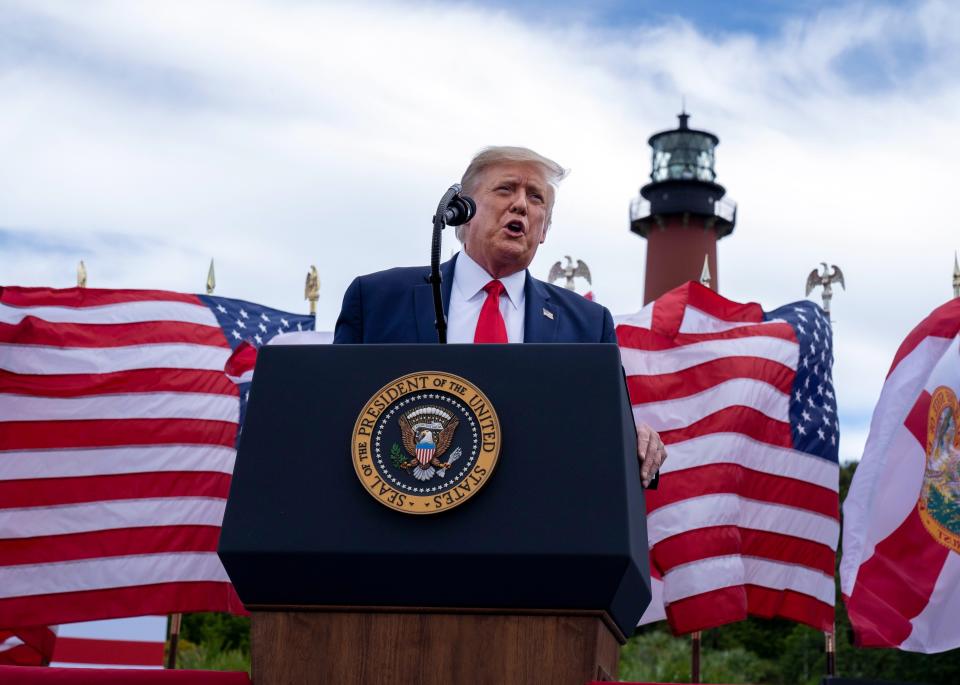Q&A: Justice Department wants to defend Trump in former columnist's defamation case
WASHINGTON – President Trump stands to gain from the Justice Department's move late Tuesday to have the federal government defend him in a defamation lawsuit brought by an author who claims he raped her in a Manhattan department store decades ago.
By certifying that Trump was acting as president when he denied the accusation and said E. Jean Carroll was "not my type," the department stands a good chance of claiming governmental immunity and having the case dismissed.
But even if that doesn't happen, the case still will be moved from state to federal court, delaying a process that had reached the discovery phase with less than two months remaining in Trump's reelection campaign.
"He'll get the delay either way, but he might even get dismissal," said Stephen Vladeck, a professor at the University of Texas School of Law. "What really smells about it is the timing."
More: Justice Department asks to defend Trump in rape accuser E. Jean Carroll's defamation lawsuit
Attorney General William Barr on Wednesday defended his department's action as routine under the Westfall Act, which allows state law tort claims against federal employees to be moved to federal court, with the United States as the defendant.
"This was a normal application of the law. The law is clear. It is done frequently," Barr said during an appearance in Chicago. "And the little tempest that’s going on is largely because of the bizarre political environment in which we live."
Here's what we know about the legal wrangling over the rape allegation and defamation lawsuit:
Question: What is Carroll's accusation?
Answer: The former Elle magazine writer says Trump raped her at Bergdorf Goodman, a luxury New York City department store, in the mid-1990s. She accused him of defamation in 2019 after he said the incident never occurred.
More: E. Jean Carroll, columnist who says Donald Trump raped her, fired from Elle
Q: What has happened up to now?
A: A New York state court has rejected Trump’s claim of immunity from the private lawsuit. Carroll has been seeking a DNA sample as possible evidence and to have Trump deposed under oath.
"Trump was soon going to be required to produce documents, provide a DNA sample, and sit for a deposition," Carroll's lawyer, Roberta Kaplan, said in a statement.
Q: What happened on Tuesday?
A: The Justice Department's Civil Division submitted court papers to substitute the United States as the defendant.
"Numerous courts have recognized that elected officials act within the scope of their office or employment when speaking with the press, including with respect to personal matters, and have therefore approved the substitution of the United States in defamation actions," the filing by DOJ attorney Stephen Terrell said.

Q: What are the relevant statutes?
A: The Federal Tort Claims Act of 1946 allows for lawsuits to be filed against the United States in federal court for actions taken by its employees. The Westfall Act of 1988 basically requires such a substitution of the United States as defendant and grants the employees immunity.
Q: How common is the Justice Department's action?
A: Very common. Robert Loeb, a former Civil Division appellate lawyer, said it provides protection for federal workers acting in their official capacity. In private-sector tort cases, the doctrine generally helps plaintiffs, because employers have deeper pockets than their workers to pay any possible court awards.
As an example, former President George W. Bush and members of his administration used the Westfall Act to avoid being sued personally in U.S. courts by victims of the Iraq war.
Q: So what's unusual about this case?
A: The incident that prompted the defamation lawsuit was a personal matter that allegedly occurred long before Trump was elected president.
“That isn’t within the scope of his employment. That has nothing to do with his employment," Loeb said. But "a lot of things are covered that would surprise people."
Q: Why is the Justice Department's timing curious?
A: It could have raised this issue at the very beginning of legal proceedings. By waiting until now, it allowed the state court action to take up months before moving to federal court.
"The timing is what is disturbing here," said Gregory Sisk, a professor at St. Thomas University School of Law and an expert on the Federal Tort Claims Act. "To do it after months and months, and discovery moving forward, is odd."
Q: Has the Justice Department interceded on Trump's behalf before?
A: Many times. Barr sought to reduce Trump associate Roger Stone's prison sentence before it was commuted by the president. He also tried to dismiss the department's case against former national security adviser Michael Flynn, which a federal court has blocked.
This article originally appeared on USA TODAY: E. Jean Carroll case: Justice Department asks to defend Donald Trump

